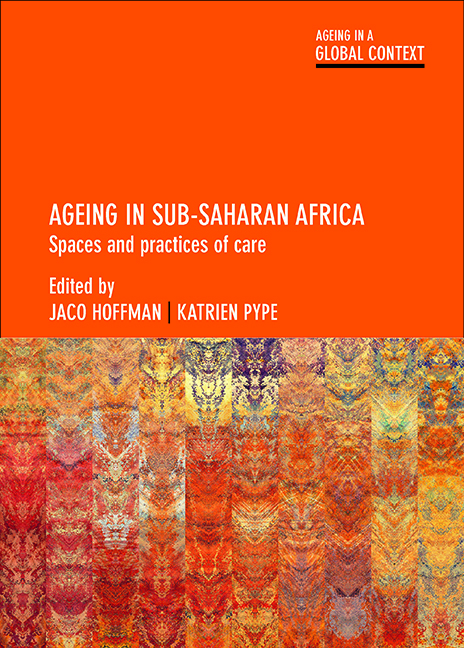Book contents
- Frontmatter
- Dedication
- Contents
- Lists of photos, figures and tables
- Notes on contributors
- Series preface
- Acknowledgements
- Introduction: Spaces and practices of care for older people in Sub-Saharan Africa
- one Will families in Ghana continue to care for older people? Logic and contradiction in policy
- two Caring for people ‘without’ value: movement, reciprocity and respect in Kinshasa’s retirement homes
- three Older people providing care for older people in Tanzania: against conventions – but accepted
- four Place matters: the home as a key site of old-age care in coastal Tanzania
- five Care and identity in rural Malawi
- six Making sense of neglect in northwest Tanzania
- seven Negotiating care for older people in South Africa: between the ideal and the pragmatics
- Afterword: Discourses of care for older people in Sub-Saharan Africa: towards conceptual development
- Index
five - Care and identity in rural Malawi
Published online by Cambridge University Press: 05 April 2022
- Frontmatter
- Dedication
- Contents
- Lists of photos, figures and tables
- Notes on contributors
- Series preface
- Acknowledgements
- Introduction: Spaces and practices of care for older people in Sub-Saharan Africa
- one Will families in Ghana continue to care for older people? Logic and contradiction in policy
- two Caring for people ‘without’ value: movement, reciprocity and respect in Kinshasa’s retirement homes
- three Older people providing care for older people in Tanzania: against conventions – but accepted
- four Place matters: the home as a key site of old-age care in coastal Tanzania
- five Care and identity in rural Malawi
- six Making sense of neglect in northwest Tanzania
- seven Negotiating care for older people in South Africa: between the ideal and the pragmatics
- Afterword: Discourses of care for older people in Sub-Saharan Africa: towards conceptual development
- Index
Summary
Introduction
Political and academic concern that care for older adults in Sub-Saharan Africa is insufficient and under strain in light of changing demography and society is long standing (UN, 1982), but poorly set out. Questions remain unanswered: What is meant by ‘care’ and what is the care that older adults need? Do (all) older adults want this (undefined) care? If they do, when do they want it and from whom? Much of the established discourse implies incapacity in older age, a burden of care to be shouldered by family, and homogenised ‘elderly people’ who want, and sometimes successfully motivate, care.
In 2008 I started a conversation with older men and women in rural Malawi about their experiences of ageing. Caregiving and -receipt was a recurring narrative in our discussions, and at the heart of their understandings of older age. ‘Care’, ‘help’, ‘assistance’, ‘support’, ‘looking after’ and ‘keeping’, were used interchangeably in conversations to refer to a wide variety of practices, from assistance with washing, mobility and feeding (‘basic activities of daily living’) and farm- and housework (‘instrumental activities of daily living’), to gifts of maize, clothes and money, as well as vigilance to need, for example, by regularly visiting to monitor a person's welfare as they aged. Some older adults were receiving this broadly defined care, and from those from whom they expected it; some were not, left without care because of poverty, HIV, poor planning or just bad luck:
A lot of people passed away, so the ones who are left behind cannot care for the old people: that old person complains, ‘It would be better God took me.’ Then there are other old people who have children, who have gone to school and are working, so when that old man is ageing, the children assist him. And there are other old people who suffer, even though they have children. (Estina, female, 55)
As might be expected, and found in other settings (see Van der Geest, Chapter One), care was inconsistently presented, even within a single interview. Sometimes participants would talk about the care they received and at other times deny receiving any help at all.
- Type
- Chapter
- Information
- Ageing in Sub-Saharan AfricaSpaces and Practices of Care, pp. 115 - 136Publisher: Bristol University PressPrint publication year: 2016

